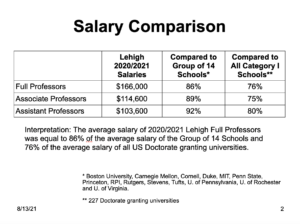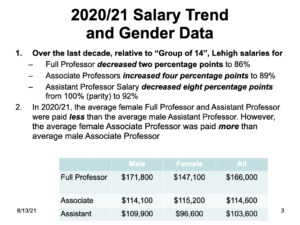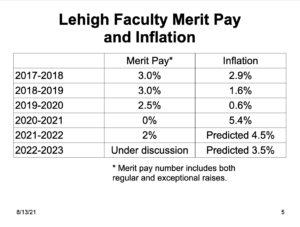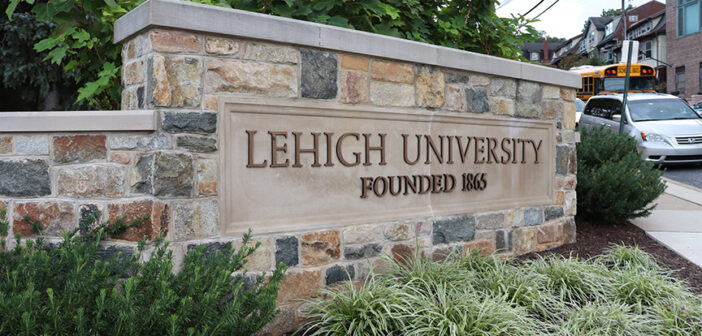Lehigh faculty are earning less on average than those at comparable schools, according to research by the American Association of University Professors.
Professor of economics, Frank Gunter created a presentation, which can be found under the Sept. 3 heading titled Faculty Compensation Presentation, comparing Lehigh faculty compensation to that of professors from 14 comparable schools, using research data from the AAUP.
The group of 14 schools includes Boston University, Carnegie Mellon, Cornell, Duke, MIT, Penn State, Princeton, Rensselaer Polytechnic Institute, Stevens, Tufts, the University of Pennsylvania, University of Rochester, University of Virginia and Lehigh.
The average salary of a Lehigh full time professor is 86 percent of the average salary of professors at the other universities, and 76 percent compared to 227 other doctorate-granting universities in the U.S., the data said.
The average salary for full time professors at Lehigh for 2020-2021 is $166,000. The average salary for full time professors at the comparable schools is $192,900, the data said.

Credit: Faculty Compensation Presentation by Frank Gunter
The average salary for associate professors for 2020-2021 is $114,600, which is 89 percent of the average salary from the comparable universities and 75 percent that of the 227 other doctorate-granting universities in the U.S.
The average salary for assistant professors for 2020-2021 is $103,600, which is 92 percent of the average salary from the comparable universities and 80 percent that of the 227 other doctorate-granting universities in the U.S.
Salaries for full time professors have decreased two percentage points over the last decade. Associate professor salaries have increased four percentage points and assistant professor salaries have decreased eight percentage points, according to the data.
The presentation said in 2020-2021, the average female full time and assistant professor were paid less than the average male full time and assistant professor. However, female associate professors were paid more on average than male associate professors.

Credit: Faculty Compensation Presentation by Frank Gunter
Full time male professors were paid $171,800 and full time female professors were paid $147,100, for an average of $166,000.
Associate male professors were paid $114,100 and associate female professors were paid $115,200.
Assistant male professors were paid $109,900 and assistant female professors were paid $96,600.
The presentation said most merit pay raises were, and continue to be, offset by inflation.

Credit: Faculty Compensation Presentation by Frank Gunter
“Inflation in 2021/2022 is expected to exceed 4.5 percent. Since 2021/2022 ‘merit pay’ increase is only 2 percent, the average faculty member can expect a 2.5 percent real decline in salary,” the presentation said.
Gunter said when it comes to these groups, what he has seen happen is they come to Lehigh, stay for a few years to do research and then get offers from different schools.
“I think one of the ways that we can prevent that from happening is to be more aggressive in merit pay,” he said.
Gunter said reputation and salary are factors new hires are looking for and Lehigh must make highly competitive offers for compensation.
Peter Zeitler, chair of the College of Arts and Sciences, said if this salary trend continues, it will lower Lehigh’s ability to attract and retain faculty and staff.
“I think the sense that many of us have is that faculty and staff salaries have been eroding significantly due to inflation over the past decade,” he said. “The past year might be particularly bad depending on how high inflation turns out to be, and because due to the pandemic, Lehigh withheld contributions to retirement accounts.”
Pat Johnson, vice president for finance and administration, said last year, all salaries and contributions to retirement plans froze because of the pandemic and the uncertainty.
“People weren't in school,” Johnson said. “We couldn't have people in attendance in person. We only had a limited number of first year students on campus. So, last year's budget, we did reset.”
Johnson said that due to the pandemic and general cutbacks to salaries, competition finding jobs in higher education has grown.
As people are working longer and not retiring as quickly as before, there are fewer spaces open for potential hires looking to pursue a tenure track, Johnson said.
Provost Nathan Urban said there can be as many as 50 to 100 applicants for a position. He said if the university does not find the right fit, sometimes they will wait to try again next year.
“In my view, it is really important to get the right people, the best people and hire them as faculty because we want to be successful,” Urban said. “We want them to do a great job with teaching, we want them to have success in their research activities. I would rather wait for the right person than hire somebody where we’re not quite sure.”
Urban said that in the time he has been at Lehigh, he has been very comfortable with the quality of faculty they have been able to hire.
Gunter said Lehigh has a tradition of quality undergraduate teaching, and that’s an attractive element for professors.
“If we can capture the brilliant young men, young women and graduate students and get them to come to Lehigh, then Lehigh has a future,” he said.
Urban said while inflation would push salary increases to be higher, they must also recognize that would require raising tuition.
“We need to balance what we can do in terms of salary increase with what we think we can do in terms of tuition increase,” Urban said.
Faculty Senate is bringing these issues up for discussion to gain visibility leading up to January when President Helble presents the budget parameters to the Board of Trustees, Gunter said.
“Especially with COVID, especially with it becoming much more competitive to fill the first-year class, the administration has a lot of balls in the air,” Gunter said.
Gunter said the faculty is one of the more important interests that the administration is juggling right now.
“Trust me, it'll be interesting to see what happens,” he said.






Comment policy
Comments posted to The Brown and White website are reviewed by a moderator before being approved. Incendiary speech or harassing language, including comments targeted at individuals, may be deemed unacceptable and not published. Spam and other soliciting will also be declined.
The Brown and White also reserves the right to not publish entirely anonymous comments.
13 Comments
Virtually all these competitive schools except Penn State are in substantially higher cost of living communities than the Lehigh Valley.
More than half are also in very high state & Local real estate tax states that should factor in at least a 10% tax impact adjustment to the salaries at those Universities.
Therefore this data while interesting is effectively useless in its base form for assessing Lehigh competitiveness for faculty salaries.
The Lehigh Valley is a high quality of life location that is not factored into the equations. This study is as flawed as those advocating for a $15/hr national competitive wage assuming that cost of living is the same in rural Iowa as New York City.
This is no shade at the author who is probably super lovely and this is a great article Bc I’m glad this information is out there, but I’m gonna take a second to critique this @ lehigh in particular. You’re paying roughly $166,000 to professors who make racist statements and we are supposed to sympathize with them? Boo hoo, Frank can’t afford a second vacation home.
It’s one thing to advocate for better pay for teachers, but six figures is still a lot, though I will admit they make less than our president, which is another discussion altogether. Lehigh gets endowments and donations constantly and there is no transparency on how any of it is given out/used. Give students better financial aid, pay your graduate students better for doing what professors don’t want to do, pay Sodexo workers better, and start hiring better people with morals that live up to your diversity and inclusion policies.
Moral of the story: Lehigh sure is underpaying a lot of people for a private school with tons of money and a total cost of $73k.
Does Lehigh really think they are comparable to UPenn or Princeton?
Good point regarding comparable schools in addition to the cost of living differences. Lehigh is one of the highest paying employers in the Lehigh Valley and significantly higher than other colleges.
Same exists for their staff positions relative to similar positions in private businesses in Bethlehem. The new President needs to cut out the fat that exists across the University including faculty salaries.
I graduated in the aughts when Lehigh was still in the top 30’s of nationally ranked universities according to US News. Back then, it could at least be mentioned in the same sentence as Princeton and UPenn. Now I pretty much only tell people at my masters (from a top state system) unless specifically asked.
Oh, how life for professors varies from one campus to the next. I am a published, tenured professor of history with 26 years of experience at one of the nation’s largest public historically black universities. I have three degrees from one of the most prestigious universities in the nation. I have taught approximately 10 thousand students over the course of my career in higher education. My teaching evaluations are consistently high. Notwithstanding the aforementioned details, my salary barely approximates the total cost of one year’s tuition at Lehigh. But I still get the author’s point, and I hope the professors achieve the equity they deserve. ???
Part time faculty pay at Lehigh is less than restaurant workers make.
Oh, how life for professors varies from one campus to the next. I am a published, tenured professor of history with 26 years of experience at one of the nation’s largest public historically black universities. I have three degrees from one of the most prestigious universities in the nation. I have taught approximately 10 thousand students over the course of my career in higher education. My teaching evaluations are consistently high. Notwithstanding the aforementioned details, my salary barely approximates the total cost of one year’s tuition at Lehigh. But I still get the author’s point, and I hope the professors achieve the equity they deserve. ???
Do staff next. I can assure you, the median staff salary isn’t $100k+, and staff raises have historically been lower than faculty ones.
Look into staff next. I’m a staff member who works full time, 9 months of the year and make less than 30k. Plus we get constantly treated poorly compared to faculty.
Lehigh staff are overpaid for the market where non a non-profit entity pays more than local businesses. The only place worse in that regard is the government entities in the Lehigh Valley.
The article refers to Full Professors as “Full time” professors. That is not accurate. The Associate and Assistant Professors are also full-time. A full professor (a term that is used commonly is academe) is simply someone who as achieved the rank of Professor (after being hired as an Assistant Professor and being promoted to Associate Professor before becoming a (full) Professor. It has nothing to do with how many hours they work.
if you care about life and money, then it means you are not qualified as a professor. please leave this position to someone else. true scholars don’t care 5-10% difference in payment.